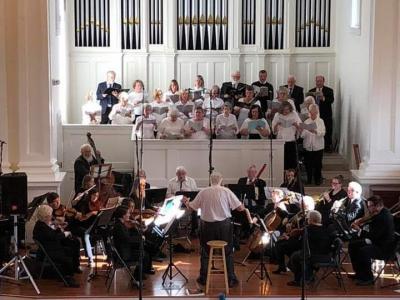Mayflower Chamber Orchestra to present Baroque Christmas Concerts
On November 12th and 13th, the Mayflower Chamber Orchestra under the direction of J. Fred Thornton will present its pandemic-postponed (from 2021) program entitled “A Baroque Christmas: Music from 18th Century Europe”. Both performances are free to the public, although a donation of $10 to $20 to help pay for the orchestral musicians is suggested.
The Saturday evening November 12th concert will be held at the St. Isidore Parish Hall, 53 Oak Street, Middleboro, starting at 7:30 p.m. The Sunday afternoon November 13th performance will be held at the Central Congregational Church, 2 Webster Street, Middleboro, starting at 3:00 p.m. Both buildings are wheelchair accessible. Pandemic protocols such as the wearing of masks are suggested but not required.
The November 12th performance was originally scheduled to take place at Saints Martha and Mary Church in Lakeville but had to be moved because that church is temporarily without heat.
The orchestra consists of free-lance musicians who play with other orchestras on the South Shore. In the past, they accompanied the Mayflower Chorale from 1984 through its last “Messiah Sing” in 2004, and the Chorale’s successor, the Mayflower Camerata, since 2016. Their performances included major works by Bach (the “Mass in B Minor”), Handel, Gluck (“Orfeo and Euridice”), Haydn (“The
Creation”, “The Seasons”, and the “Lord Nelson Mass”), Mozart (“Mass in C Minor” and the “Requiem”), Beethoven (the Ninth Symphony and “Choral Fantasy”), Mendelssohn (“Elijah”), and Requiems by Brahms, Faure, and Rutter. At these concerts they occasionally performed works for orchestra alone, including Vivaldi’s “The Four Seasons”; Mozart’s Symphonies Nos. 29, 38, & 39, and Piano Concertos Nos. 9 and 23 (with Henry Santos as soloist); and Haydn’s Symphonies Nos. 49 and 70. Earlier this fall the Mayflower Chamber Orchestra performed a pair of all-Beethoven concerts without choral participation, including the “Coriolan” Overture and the 5th and 7th Symphonies.
This Baroque Christmas program will include music primarily from Italy and Germany, but also from the Netherlands and England. From Italy there will be three “Christmas Concertos” for string orchestra by Arcangelo Corelli (1653-1713), Giuseppe Torelli (1658-1709), and Francesco Manfredini (1684-1762); as well as the little “Christmas Symphony” by Gaetano Schiassi (1698-1754). These four works, of which Corelli’s is probably the earliest and certainly the best known, all feature a ChristmasEve “Pastorale”, a dance in a lilting 12/8 rhythm with simple harmonies, depicting the shepherds watching their flocks in anticipation. (Probably the most familiar example is the one in Part 1 of Handel’s “Messiah”.)
Germany is represented by Johann Sebastian Bach (1685-1750) and his “Orchestral Suite No. 4 in D Major”, for strings, woodwinds, trumpets, and tympani. This, as well as with the remaining pieces on the program, was not specifically composed for the Christmas season, but certainly captures its celebratory spirit. Also from Germany is an unusual little work by Georg Philipp Telemann (1681-1767), the “Concerto for Four Unaccompanied Violins in D Major”.
From the Netherlands we have the “Concerto Armonico No. 1 in G Major” by the virtually unknown but very talented Count Unico Wilhelm van Wassenaer. This is the first of a set of six concertos for strings first published anonymously (by his request) in 1740, but with the tantalizing note from the publisher that they were by “an illustrious hand”. It was generally assumed that they were by a well-known composer, and Giovanni Battista Pergolesi (1710-1736) was the name most often associated with them. It wasn’t until 1980, however, that the mystery was finally solved by the Dutch musicologist Albert Dunning, who located the original manuscripts in the archives of Twickel Castle near The Hague. Van Wassenaer was an “illustrious hand” alright, but as an important diplomat, and not as a musician/composer. For him, music was strictly an avocation, although he maintained a small string orchestra for which his concertos were written.
Lastly, from England, the concerts will close with the “Hallelujah!” Chorus from ”Messiah” by that transplanted German, George Frederic Handel (1685-1759). “Messiah”, like all of Handel’s oratorios, was composed for performance during Lent, but since the 18th century it has become a staple for the Christmas season. This may be performed at the Sunday afternoon concert with voices, along with the “Hallelujah” from “Christ on the Mount of Olives” by Beethoven (not baroque, but certainly in the right spirit).
Those wishing to join in the singing of these two choral pieces should contact the director at j.fred.thornton@comcast.net regarding a rehearsal on Friday evening November 4th (7:30 p.m. at Central Congregational Church), and a “dress rehearsal” with the orchestra on Thursday evening November 10th (7:30 p.m. at St. Vincent de Paul Parish Hall). These concerts are supported primarily by grants from the Local Cultural Councils of Berkley, Bridgewater, Carver, Freetown, Halifax, Lakeville, Middleboro, Plymouth, Plympton, Raynham, Rochester, and Wareham; local agencies which are supported by the Massachusetts Cultural Council, a state agency.













